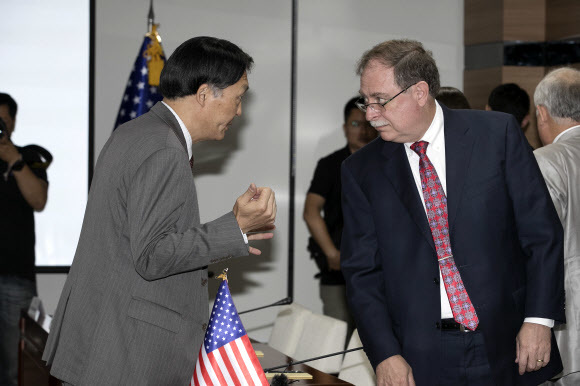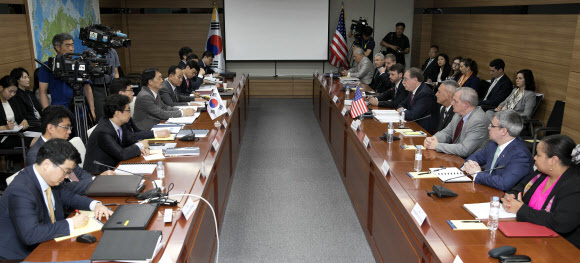 |
|
South Korean ambassador to the cost-sharing talks Chang Won-sam (left) and US Statement Department representative Timothy Betts engage in dialogue during the fourth meeting regarding the 10th Special Measures Agreement on defense cost-sharing on June 26 at the Korean National Diplomatic Academy (KNDA) in Seoul’s Seocho District. (Yonhap News)
|
Observers waiting to see if new political atmosphere on Korean Peninsula affects US position
South Korean and US representatives at a fourth meeting in Seoul on June 26 for the two sides’ 10th Special Measures Agreement on defense cost-sharing took note of the changing political situation on the Korean Peninsula. With two sides agreeing to postpone some of their joint military exercises in the wake of a June 15 North Korea-US summit in Singapore, observers are now watching to see what changes there are in the US’s demands to share costs for the deployment of strategic assets, which has emerged as a major issue during the talks. “Many changes have recently been predicted for the Korean Peninsula’s security environment, and I think we all agree on the importance of reaching a harmonious resolution to discussions on the sharing of defense costs to contribute to establishing conditions for the stable stationing of US Forces Korea, strengthening the allied defense system, and strengthening the South Korea-US alliance,” said Ministry of Foreign Affairs (MOFA) ambassador to the cost-sharing talks Chang Won-sam in introductory remarks for the meeting, which took place that morning at the Korean National Diplomatic Academy (KNDA) in Seoul’s Seocho District. “I believe the two sides have sufficiently grasped and understood the other’s position over the course of the three previous meetings,” he added. “I hope that this meeting will mark the beginning of real progress in a spirit of mutual understanding and respect,” he continued. Despite three rounds of talks since March, the two sides have yet to bridge their differences on their respective total shares of defense costs to be applied as of 2019. Speaking after Chang, the US State Department representative to the talks, Timothy Betts, began his remarks by saying that rapid changes in the Korean Peninsula situation were adding an element of excitement to hopes for the future.
 |
|
South Korean and US representatives at the fourth meeting of the 10th Special Measures Agreement on defense cost-sharing on June 26 at the Korean National Diplomatic Academy (KNDA) in Seoul’s Seocho District. (Yonhap News)
|







